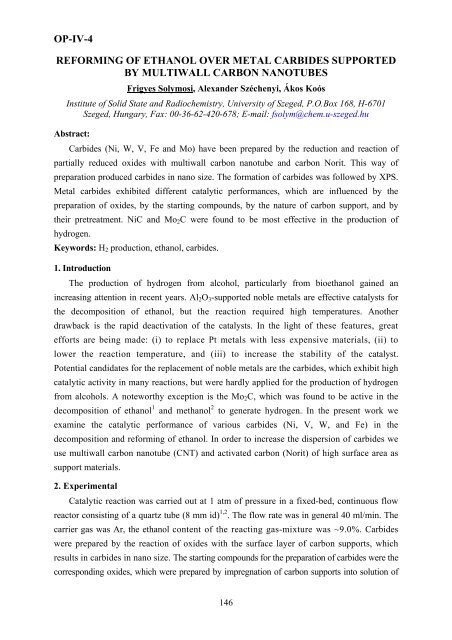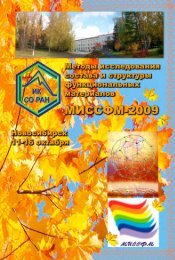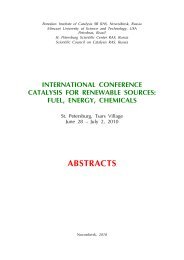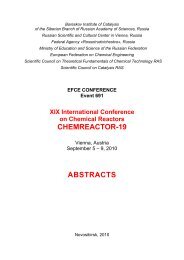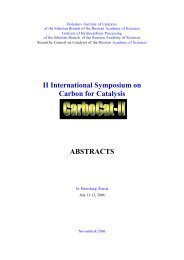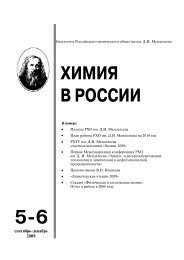- Page 1 and 2:
Boreskov Institute of Catalysis of
- Page 3 and 4:
Mikhail G. Slinko,Honour ChairmanVa
- Page 5 and 6:
PLENARY LECTURES
- Page 7:
PL-1built up from an intrinsic cont
- Page 10 and 11:
PL-3DEVELOPMENT OF ZEOLITE-COATED M
- Page 12 and 13:
PL-4processes in order to evaluate
- Page 14 and 15:
PL-5CATALYTIC PARTIAL OXIDATION OF
- Page 16 and 17:
KEY-NOTE PRESENTATIONS
- Page 18 and 19:
KN-2GETTING TO THE POINT: FROM MOLE
- Page 20 and 21:
KN-3PROBLEMS AND PROSPECTS FOR IMRO
- Page 22 and 23:
KN-4remain out of the sight of rese
- Page 24 and 25:
KN-5SSITKA allows to study not only
- Page 26 and 27:
KN-6individual reaction stages with
- Page 28 and 29:
Section 1.Kinetics of catalytic rea
- Page 30 and 31:
OP-I-1-specialthat Г s /f changed
- Page 32 and 33:
OP-I-3-specialKINETIC MODELING OF L
- Page 34 and 35:
OP-I-4PARTIAL OXIDATION OF TOLUENE
- Page 36 and 37:
OP-I-5Also, the approach to modelin
- Page 38 and 39:
OP-I-6starch granules, but after a
- Page 40 and 41:
OP-I-8KINETICS OF CARBON MONOXIDE O
- Page 42 and 43:
OP-I-9CHAOTIC DYNAMICS IN THE THREE
- Page 44 and 45:
OP-I-10ADSORPTION OF COMPLEX MOLECU
- Page 46 and 47:
OP-I-11KINETIC ASPECTS OF METHANE O
- Page 48 and 49:
OP-I-12KINETIC STUDIES IN STRUCTURE
- Page 50 and 51:
OP-I-13A STUDY ON THERMAL COMBUSTIO
- Page 52 and 53:
OP-I-14KINETICS OF THE CONVERSION O
- Page 54 and 55:
OP-I-15HYDROCRACKING OF LONG CHAIN
- Page 56 and 57:
OP-I-16KINETICS IN THE HYDROGENATIO
- Page 58 and 59:
OP-I-17MECHANISM OF FORMATION OF ET
- Page 60 and 61:
OP-I-18KINETIC STUDIES OF PROPANE D
- Page 62 and 63:
OP-I-19ACTIVITY AND DEACTIVATION OF
- Page 64 and 65:
OP-I-20GAS PHASE OXIDATION OF FORMA
- Page 66 and 67:
OP-I-21Where k A is the rate consta
- Page 68 and 69:
OP-I-22al., 2008; Monolith, 2008).
- Page 70 and 71:
OP-I-23Fig. 1. Scheme of the FIM ma
- Page 72 and 73:
OP-I-24Θ DZ centersdeactivationr D
- Page 74 and 75:
OP-I-25equation [2] to nitrogen iso
- Page 76 and 77:
OP-II-1CHEMICAL NANOREACTORS AS BAS
- Page 78 and 79:
OP-II-2gas model use, there is no n
- Page 80 and 81:
OP-II-3Taking into account these pr
- Page 82 and 83:
OP-II-4WATER2METH1STEAM2AOFF3AIR10O
- Page 84 and 85:
OP-II-5completely dry, at the same
- Page 86 and 87:
OP-II-6Many factors have been found
- Page 88 and 89:
OP-II-7mechanistic and kinetic stud
- Page 90 and 91:
OP-II-9MODELLING OF DIESEL PARTICUL
- Page 92 and 93:
Section 3.Catalytic processesí dev
- Page 94 and 95:
OP-III-1BIC’s catalyst for N 2 О
- Page 96 and 97: OP-III-2powder sample with the same
- Page 98 and 99: OP-III-3Analysis of the results sho
- Page 100 and 101: OP-III-4Exhaustaftertreatmenttechno
- Page 102 and 103: OP-III-6SOME PROPERTIES OF PEROVSKI
- Page 104 and 105: OP-III-7with the conventional react
- Page 106 and 107: OP-III-8resistance is the membrane
- Page 108 and 109: OP-III-9mass dispersion and to anal
- Page 110 and 111: OP-III-11PROCESS INTENSIFICATION US
- Page 112 and 113: OP-III-12ETHYL ACETATE SYNTHESIS BY
- Page 114 and 115: OP-III-12products are vaporized and
- Page 116 and 117: OP-III-13The reforming reaction was
- Page 118 and 119: OP-III-14reactivity (compared to ot
- Page 120 and 121: OP-III-15Fig. 2. The spent Smopex-1
- Page 122 and 123: OP-III-16Numbers of curves are acco
- Page 124 and 125: OP-III-17perimeter were determined.
- Page 126 and 127: OP-III-18of 2. MSR has been coupled
- Page 128 and 129: OP-III-19chemisorption heat and pro
- Page 130 and 131: OP-III-20In the experiments, total
- Page 132 and 133: OP-III-21obtained by the new techno
- Page 134 and 135: OP-III-22reactor wall from the two-
- Page 136 and 137: OP-III-23and parameters of synthesi
- Page 138 and 139: OP-III-24Results and discussionThe
- Page 140 and 141: OP-IV-1DEEP DESULPHURIZATION OF PET
- Page 142 and 143: OP-IV-2LACTIC ACID AS A BACKGROUND
- Page 144 and 145: OP-IV-3CO REMOVAL FROM H 2 -rich GA
- Page 148 and 149: OP-IV-5MODELING OF HYDROGEN PRODUCT
- Page 150 and 151: OP-IV-6PRODUCTION OF HYDROGEN FROM
- Page 152 and 153: OP-IV-7SYNTHESIS GAS PRODUCTION FRO
- Page 154 and 155: OP-IV-8HYDROGEN PRODUCTION FROM MET
- Page 156 and 157: OP-IV-9A NEW GENERATION OF SUPER-TH
- Page 158 and 159: OP-IV-10EXERGY ANALYSIS OF ENZYMATI
- Page 160 and 161: OP-IV-11ADVANCEMENT OF SLURRY BUBBL
- Page 162 and 163: OP-IV-12Pd-DOPED PEROVSKITE CATALYS
- Page 164 and 165: OP-IV-13HYDROGEN PRODUCTION VIA MET
- Page 166 and 167: Section 5.Catalytic processing of r
- Page 168 and 169: OP-V-1Scheme 1. The developing path
- Page 170 and 171: OP-V-2An example of the model compo
- Page 172 and 173: OP-V-3catalysts were shown to be su
- Page 174 and 175: OP-V-4Catalyst deactivation was mor
- Page 176 and 177: OP-V-53) Study of the FFAs esterifi
- Page 178 and 179: OP-V-6In the present work, a compre
- Page 180 and 181: OP-V-7Ca 2 Fe 2 O 5 , MgFe 2 O 4 an
- Page 182 and 183: OP-V-8cellulose components decompos
- Page 184 and 185: OP-V-9sintering a couple of spirale
- Page 186 and 187: OP-V-10Catalyst preparationA series
- Page 188 and 189: OP-V-11Catalysts characterizationIn
- Page 190 and 191: OP-V-12Kinetic ExperimentsHexadecan
- Page 192 and 193: OP-V-13DESIGN OF PILOT REACTOR AND
- Page 194 and 195: OP-V-14DEVELOPMENT OF A LAB SCALE C
- Page 196 and 197:
OP-V-15DEVELOPMENT OF TWO-STAGE PRO
- Page 198 and 199:
OP-V-15The data of Table 2 show, th
- Page 200 and 201:
OP-V-17ENERGY PRODUCTION FROM BIOMA
- Page 202 and 203:
OP-V-18CATALYTIC PARTIAL OXIDATION
- Page 204 and 205:
OP-V-19A PHOTOCATALYTIC REACTOR FOR
- Page 206 and 207:
OP-V-20BIOMASS GASIFICATION IN A CA
- Page 208 and 209:
OP-V-21ESTIMATION OF OPTIMAL REACTO
- Page 210 and 211:
POSTER PRESENTATIONSSection 1. Kine
- Page 212 and 213:
PP-I-1CONVERSION OF ETHANOL OVER CO
- Page 214 and 215:
PP-I-2LATERAL INTERACTIONS, FINITE
- Page 216 and 217:
PP-I-3UTILIZATION OF TAFT EQUATION:
- Page 218 and 219:
PP-I-4SELECTIVE HYDROGENATION OF CI
- Page 220 and 221:
PP-I-5NON OXIDATIVE REGENERATION ME
- Page 222 and 223:
PP-I-6Table 1. Parameters in kineti
- Page 224 and 225:
PP-I-7where: k nc , k 1 , k a , k b
- Page 226 and 227:
PP-I-8After each adsorption or deso
- Page 228 and 229:
PP-I-9The increase in pressure, in
- Page 230 and 231:
PP-I-10The analysis of the composit
- Page 232 and 233:
PP-I-11The network of βP oxidation
- Page 234 and 235:
PP-I-12order of magnitude lower. Th
- Page 236 and 237:
PP-I-13ab1,01,0Isotope fraction0,5[
- Page 238 and 239:
PP-I-14Relations ‘rate vs alcohol
- Page 240 and 241:
PP-I-15[EEAA] t , M[EEAA] t -1 , M
- Page 242 and 243:
PP-I-17NEW OSCILLATING REACTION:CAR
- Page 244 and 245:
PP-I-18NEW OSCILLATING REACTIONS OF
- Page 246 and 247:
PP-I-19KINETICS OF GAS-LIQUID PROCE
- Page 248 and 249:
PP-I-20COMPLETE OXIDATION OF HARMFU
- Page 250 and 251:
PP-I-21THEORETICAL RESEARCH OF SURF
- Page 252 and 253:
PP-I-22INFLUENCE OF ORGANIC HELATES
- Page 254 and 255:
PP-I-23The equation of the reaction
- Page 256 and 257:
PP-I-25SELECTIVE OXIDATION OF METHA
- Page 258 and 259:
PP-I-26coefficients of the equation
- Page 260 and 261:
PP-I-27into propionic acid. The giv
- Page 262 and 263:
PP-I-28In the studied range of temp
- Page 264 and 265:
PP-I-29Table. Reaction temperature
- Page 266 and 267:
PP-I-30other in both direction of t
- Page 268 and 269:
PP-I-31Reynolds number. The boundar
- Page 270 and 271:
PP-I-32NANOPARTICLES AND CATALYSISI
- Page 272 and 273:
Section 2.Physico-chemical and math
- Page 274 and 275:
PP-II-1For investigation, we used n
- Page 276 and 277:
PP-II-2criterion «Zn dissolved in
- Page 278 and 279:
PP-II-3exist around the steady stat
- Page 280 and 281:
PP-II-4in range 0-1. In our case n
- Page 282 and 283:
PP-II-5at comparable activity, the
- Page 284 and 285:
PP-II-7CFD-CALCULATION OF MALDISTRI
- Page 286 and 287:
PP-II-8INVESTIGATION OF NONLINEAR P
- Page 288 and 289:
PP-II-8reactivity. There is a small
- Page 290 and 291:
PP-II-10CALCULATION OF INDUSTRIAL C
- Page 292 and 293:
PP-II-11type of reactors a catalyst
- Page 294 and 295:
PP-II-13MATHEMATTICAL MODELLING OF
- Page 296 and 297:
PP-II-13where I Э , M 1Э , M 2Э
- Page 298 and 299:
PP-II-14where TOC 0 is the initial
- Page 300 and 301:
PP-II-16AUTOCATALYTIC REACTION FRON
- Page 302 and 303:
Section 3.Catalytic processesí dev
- Page 304 and 305:
PP-III-1for the traditional scheme
- Page 306 and 307:
PP-III-2Initial conditions: С i (0
- Page 308 and 309:
PP-III-3Afterward, a 30% aqueous hy
- Page 310 and 311:
PP-III-4The influence of the water
- Page 312 and 313:
PP-III-5Vanadium oxide was grafted
- Page 314 and 315:
PP-III-6(T p ) was taken as an inde
- Page 316 and 317:
PP-III-7dCdτLABdCNABdτdCdτdCdτd
- Page 318 and 319:
PP-III-8O 2 , balanced by He, at a
- Page 320 and 321:
PP-III-9Solution of system (3) for
- Page 322 and 323:
PP-III-10HDT330ºCHDT350ºCHDT370º
- Page 324 and 325:
PP-III-11The activity of Au/support
- Page 326 and 327:
PP-III-1249775 m 3 /h0,65Initial te
- Page 328 and 329:
PP-III-13through one layer of ACC w
- Page 330 and 331:
PP-III-14the runs was always higher
- Page 332 and 333:
PP-III-15The experimental data for
- Page 334 and 335:
PP-III-16Catalytic hydrogenation of
- Page 336 and 337:
PP-III-17The following parameters a
- Page 338 and 339:
PP-III-18Figure 1 - Dependence of t
- Page 340 and 341:
PP-III-19Our method has some advant
- Page 342 and 343:
PP-III-20Furthermore, Ayude et al.
- Page 344 and 345:
PP-III-22OPTIMIZATION OF THE METHAN
- Page 346 and 347:
PP-III-23EXPERIMENTAL INVESTIGATION
- Page 348 and 349:
PP-III-24CATALYTIC REACTORS WITH HY
- Page 350 and 351:
PP-III-25ACTIVITY OF Cu/ZSM-5 CATAL
- Page 352 and 353:
PP-III-26SIMULATION AND OPTIMISATIO
- Page 354 and 355:
PP-III-27model of plug flow reactor
- Page 356 and 357:
PP-III-28Calculations were experime
- Page 358 and 359:
PP-III-29continuous and pressurized
- Page 360 and 361:
PP-III-30adequacy of multistage mod
- Page 362 and 363:
PP-III-31+CH 3 OHH 2 O + HO-(CH(CH
- Page 364 and 365:
PP-III-32procedure presented by Mar
- Page 366 and 367:
PP-III-33HPA-x + 2 H + + Pd 0 ⎯
- Page 368 and 369:
PP-III-34of the process as well as
- Page 370 and 371:
PP-III-35This study was financially
- Page 372 and 373:
PP-III-36phase. Peroxopolyoxometall
- Page 374 and 375:
PP-III-37performed under atmospheri
- Page 376 and 377:
PP-III-38orders of magnitude larger
- Page 378 and 379:
PP-III-39CATALYTIC REACTORS WITH ST
- Page 380 and 381:
PP-III-40THE OXIDATIVE DEHYDROGENAT
- Page 382 and 383:
PP-III-41MODELLING AND DESIGN OF TH
- Page 384 and 385:
PP-III-42COMPLEX TECHNOLOGY OF TREA
- Page 386 and 387:
PP-III-43PHOTO ELECTROCHEMISTRY APP
- Page 388 and 389:
PP-III-45MODELING OF CATALYTIC α-O
- Page 390 and 391:
PP-III-46steady states. It was show
- Page 392 and 393:
PP-III-47Results and discussion:The
- Page 394 and 395:
PP-III-49FIBROUS PALLADIUM-SUPPORTE
- Page 396 and 397:
Section 4.Catalytic technologies in
- Page 398 and 399:
PP-IV-1method is adiabatic or autot
- Page 400 and 401:
PP-IV-2It had been established that
- Page 402 and 403:
PP-IV-4INTERACTION OF ACTIVATED ALU
- Page 404 and 405:
PP-IV-5ENVIRONMENTALLY FRIENDLY PRO
- Page 406 and 407:
PP-IV-6THE 5%Ni-2%Au/Al 3 CrO 6 SYS
- Page 408 and 409:
PP-IV-7MESOPOROUS ANODES BASED ON Y
- Page 410 and 411:
PP-IV-8ADVANCED OXIDATION PROCESS F
- Page 412 and 413:
PP-IV-9PROCESSING OF POLYMERIC CORD
- Page 414 and 415:
PP-IV-10EFFECT OF SULPHUR ON THE CA
- Page 416 and 417:
PP-IV-11OXIDATIVE CONVERSION OF MET
- Page 418 and 419:
PP-IV-13CATALYTIC FLUE GAS CONDITIO
- Page 420 and 421:
PP-IV-14RIBBON POROUS NICKEL BASED
- Page 422 and 423:
PP-IV-15ETHANOL CONVERSION TO HYDRO
- Page 424 and 425:
PP-IV-16A HIGH-EFFICIENT MICROREACT
- Page 426 and 427:
PP-IV-17DIRECT DECOMPOSITION OF NIT
- Page 428 and 429:
PP-IV-18NICKEL CATALYSTS BASED ON P
- Page 430 and 431:
PP-IV-19SELECTION OF FAVOURABLE FEE
- Page 432 and 433:
PP-IV-20FORMALDEHYDE FORMATION DURI
- Page 434 and 435:
PP-IV-21PRODUCTION OF HYDROGEN-RICH
- Page 436 and 437:
PP-IV-22INFLUENCE OF COMPOSITION OF
- Page 438 and 439:
PP-IV-24ONE-STAGE CATALYTIC CONVERS
- Page 440 and 441:
PP-IV-25THE STUDY OF METHANE DEHYDR
- Page 442 and 443:
PP-IV-26MCM-41-SUPPORTED PdNi CATAL
- Page 444 and 445:
PP-IV-27IMPROVING THE FLOW SHEET OF
- Page 446 and 447:
PP-IV-29THE PARTIAL OXIDATION OF CH
- Page 448 and 449:
PP-IV-30PRODUCTION OF CO-FREE HYDRO
- Page 450 and 451:
PP-IV-31PHOTOCATALYTICAL ACTIVITY O
- Page 452 and 453:
PP-IV-32NEW ELECTRODE MATERIALSFOR
- Page 454 and 455:
PP-IV-33THE CATALYTIC HYDROGENATION
- Page 456 and 457:
PP-IV-34W 0, μmol O 2/min0,25 1. 1
- Page 458 and 459:
PP-V-1INFLUENCE OF ICE ON MEAs OF P
- Page 460 and 461:
PP-V-2DIRECT OILS HYDROGENATION TO
- Page 462 and 463:
PP-V-3DEVELOPMENT OF Pd/SIBUNIT CAT
- Page 464 and 465:
PP-V-4Pt NANOPARTICLE-HOLLOW POROUS
- Page 466 and 467:
PP-V-5THE PROCESS FOR PRODUCING ORG
- Page 468 and 469:
PP-V-6water removing. This method p
- Page 470 and 471:
PP-V-7ResultsThe presented technolo
- Page 472 and 473:
PP-V-8the most effective catalysts.
- Page 474 and 475:
PP-V-9Neither the low sulphur conte
- Page 476 and 477:
PP-V-10composition (methyl esters,
- Page 478 and 479:
PP-V-11reactor we can see that its
- Page 480 and 481:
PP-V-12Recent studies lead in this
- Page 482 and 483:
PP-V-13catalysts (e.g. Pt or Pd), t
- Page 484 and 485:
PP-V-14Alkali catalyst. For a basic
- Page 486 and 487:
PP-V-15obtaining the related profil
- Page 488 and 489:
PP-V-16reaction parameters, not rep
- Page 490 and 491:
PP-V-18STUDY OF THE CATALYTIC ACTIV
- Page 492 and 493:
PP-V-19BIOMORPHIC CATALYSTS ON THE
- Page 494 and 495:
PP-V-20Al,Cu-PILLARED CLAYS AS CATA
- Page 496 and 497:
PP-V-21KINETICS OF THE HYDROXYMATAI
- Page 498 and 499:
PP-V-22THE NEW METHOD OF OBTAINING
- Page 500 and 501:
PP-V-23containing mono- and di-subs
- Page 502 and 503:
AUTOCLAVE ENGINEERS COMPANYSYSTEMAT
- Page 504 and 505:
CATACON CATACON CATACON CATACON CAT
- Page 506 and 507:
CATACON CATACON CATACON CATACON CAT
- Page 508 and 509:
CATACON CATACON CATACON CATACON CAT
- Page 510 and 511:
George AvgouropoulosFoundation for
- Page 512 and 513:
Leonid BykovJSC «Chemphyst-Alloy L
- Page 514 and 515:
Debora FinoPolitecnico di TorinoCor
- Page 516 and 517:
Jenő HancsókUniversity of Pannoni
- Page 518 and 519:
Andrey KhudoshinLomonosov Moscow St
- Page 520 and 521:
Cristian LedesmaEnergetic Technique
- Page 522 and 523:
Uri Matatov-MeytalDepartment of Che
- Page 524 and 525:
Karina OjedaIndustrial University o
- Page 526 and 527:
Yuri PyatnitskyPisarzhevsky Institu
- Page 528 and 529:
Vera ScmachkovaBoreskov Institute o
- Page 530 and 531:
Peter StrizhakPisarzhevsky Institut
- Page 532 and 533:
Nadezhda VernikovskayaBoreskov Inst
- Page 534 and 535:
Nataliya ZubritskayaRSC «Applied C
- Page 536 and 537:
ORAL PRESENTATIONS.................
- Page 538 and 539:
OP-I-21Saeedizad M., Sahebdelfar S.
- Page 540 and 541:
OP-III-9Nekhamkina O., Sheintuch M.
- Page 542 and 543:
OP-IV-5Hernández L., Kafarov V.V.M
- Page 544 and 545:
OP-V-13Sadykov V., Mezentseva N., V
- Page 546 and 547:
PP-I-15PP-I-16PP-I-17PP-I-18PP-I-19
- Page 548 and 549:
PP-II-9 Nikiforov A., Paek U-Hyon,
- Page 550 and 551:
PP-III-17 Vernikovskaya N.V., Kashk
- Page 552 and 553:
PP-III-42 Goshu Y.W., Tsaryov Y.V.,
- Page 554 and 555:
PP-IV-17 Ohnishi C.H., Yoshino H.,
- Page 556 and 557:
PP-V-9 Hancsók J., Magyar S., Kall
- Page 558:
XVIII International Conference on C


